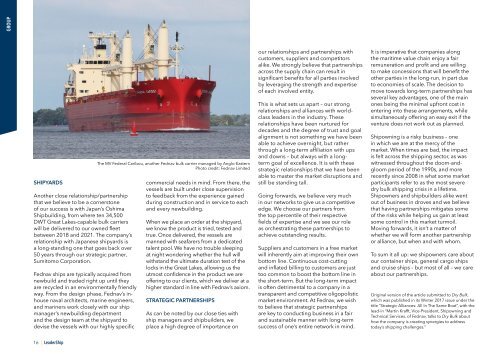AEUG18002 LeaderShip 2_2018 180227high2
You also want an ePaper? Increase the reach of your titles
YUMPU automatically turns print PDFs into web optimized ePapers that Google loves.
GROUP<br />
SHIPYARDS<br />
Another close relationship/partnership<br />
that we believe to be a cornerstone<br />
of our success is with Japan’s Oshima<br />
Shipbuilding, from where ten 34,500<br />
DWT Great Lakes-capable bulk carriers<br />
will be delivered to our owned fleet<br />
between <strong>2018</strong> and 2021. The company’s<br />
relationship with Japanese shipyards is<br />
a long-standing one that goes back over<br />
50 years through our strategic partner,<br />
Sumitomo Corporation.<br />
Fednav ships are typically acquired from<br />
newbuild and traded right up until they<br />
are recycled in an environmentally friendly<br />
way. From the design phase, Fednav’s inhouse<br />
naval architects, marine engineers,<br />
and mariners work closely with our ship<br />
manager’s newbuilding department<br />
and the design team at the shipyard to<br />
devise the vessels with our highly specific<br />
The MV Federal Caribou, another Fednav bulk carrier managed by Anglo-Eastern<br />
Photo credit: Fednav Limited<br />
commercial needs in mind. From there, the<br />
vessels are built under close supervision<br />
to feedback from the experience gained<br />
during construction and in service to each<br />
and every newbuilding.<br />
When we place an order at the shipyard,<br />
we know the product is tried, tested and<br />
true. Once delivered, the vessels are<br />
manned with seafarers from a dedicated<br />
talent pool. We have no trouble sleeping<br />
at night wondering whether the hull will<br />
withstand the ultimate duration test of the<br />
locks in the Great Lakes, allowing us the<br />
utmost confidence in the product we are<br />
offering to our clients, which we deliver at a<br />
higher standard in line with Fednav’s axiom.<br />
STRATEGIC PARTNERSHIPS<br />
As can be noted by our close ties with<br />
ship managers and shipbuilders, we<br />
place a high degree of importance on<br />
our relationships and partnerships with<br />
customers, suppliers and competitors<br />
alike. We strongly believe that partnerships<br />
across the supply chain can result in<br />
significant benefits for all parties involved<br />
by leveraging the strength and expertise<br />
of each involved entity.<br />
This is what sets us apart – our strong<br />
relationships and alliances with worldclass<br />
leaders in the industry. These<br />
relationships have been nurtured for<br />
decades and the degree of trust and goal<br />
alignment is not something we have been<br />
able to achieve overnight, but rather<br />
through a long-term affiliation with ups<br />
and downs – but always with a longterm<br />
goal of excellence. It is with these<br />
strategic relationships that we have been<br />
able to master the market disruptions and<br />
still be standing tall.<br />
Going forwards, we believe very much<br />
in our networks to give us a competitive<br />
edge. We choose our partners from<br />
the top percentile of their respective<br />
fields of expertise and we see our role<br />
as orchestrating these partnerships to<br />
achieve outstanding results.<br />
Suppliers and customers in a free market<br />
will inherently aim at improving their own<br />
bottom line. Continuous cost-cutting<br />
and inflated billing to customers are just<br />
too common to boost the bottom line in<br />
the short-term. But the long-term impact<br />
is often detrimental to a company in a<br />
transparent and competitive oligopolistic<br />
market environment. At Fednav, we wish<br />
to believe that strategic partnerships<br />
are key to conducting business in a fair<br />
and sustainable manner with long-term<br />
success of one’s entire network in mind.<br />
It is imperative that companies along<br />
the maritime value chain enjoy a fair<br />
remuneration and profit and are willing<br />
to make concessions that will benefit the<br />
other parties in the long-run, in part due<br />
to economies of scale. The decision to<br />
move towards long-term partnerships has<br />
several key advantages, one of the main<br />
ones being the minimal upfront cost in<br />
entering into these arrangements, while<br />
simultaneously offering an easy exit if the<br />
venture does not work out as planned.<br />
Shipowning is a risky business – one<br />
in which we are at the mercy of the<br />
market. When times are bad, the impact<br />
is felt across the shipping sector, as was<br />
witnessed throughout the doom-andgloom<br />
period of the 1990s, and more<br />
recently since 2008 in what some market<br />
participants refer to as the most severe<br />
dry bulk shipping crisis in a lifetime.<br />
Shipowners and shipbuilders alike went<br />
out of business in droves and we believe<br />
that having partnerships mitigates some<br />
of the risks while helping us gain at least<br />
some control in this market turmoil.<br />
Moving forwards, it isn’t a matter of<br />
whether we will form another partnership<br />
or alliance, but when and with whom.<br />
To sum it all up: we shipowners care about<br />
our container ships, general cargo ships<br />
and cruise ships – but most of all – we care<br />
about our partnerships.<br />
Original version of the article submitted to Dry Bulk,<br />
which was published in its Winter 2017 issue under the<br />
title “Strategic Alliances: All In The Same Boat”, with the<br />
lead-in “Martin Krafft, Vice-President, Shipowning and<br />
Technical Services, of Fednav, talks to Dry Bulk about<br />
how the company is creating synergies to address<br />
today’s shipping challenges.”<br />
16 | <strong>LeaderShip</strong>


